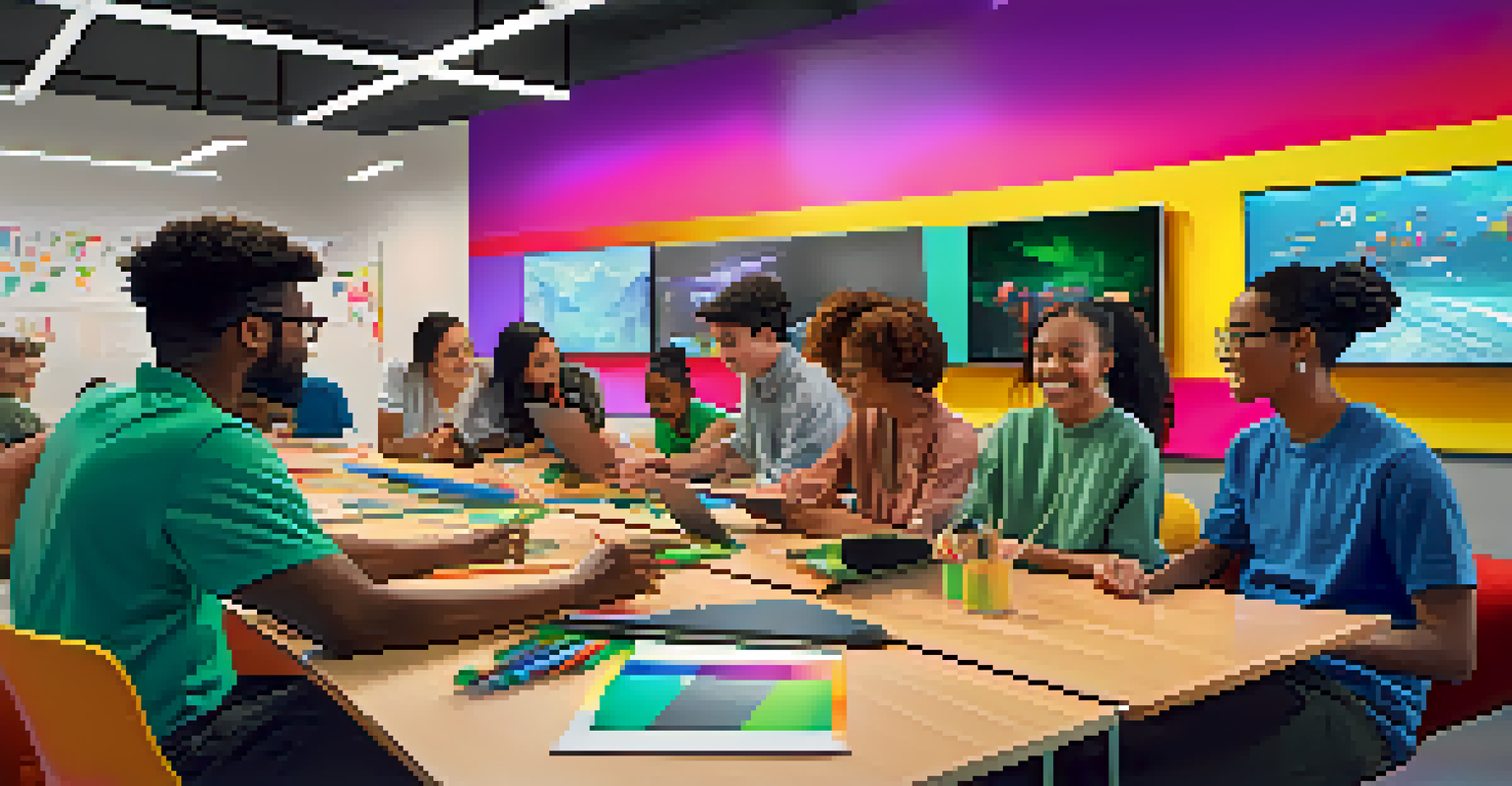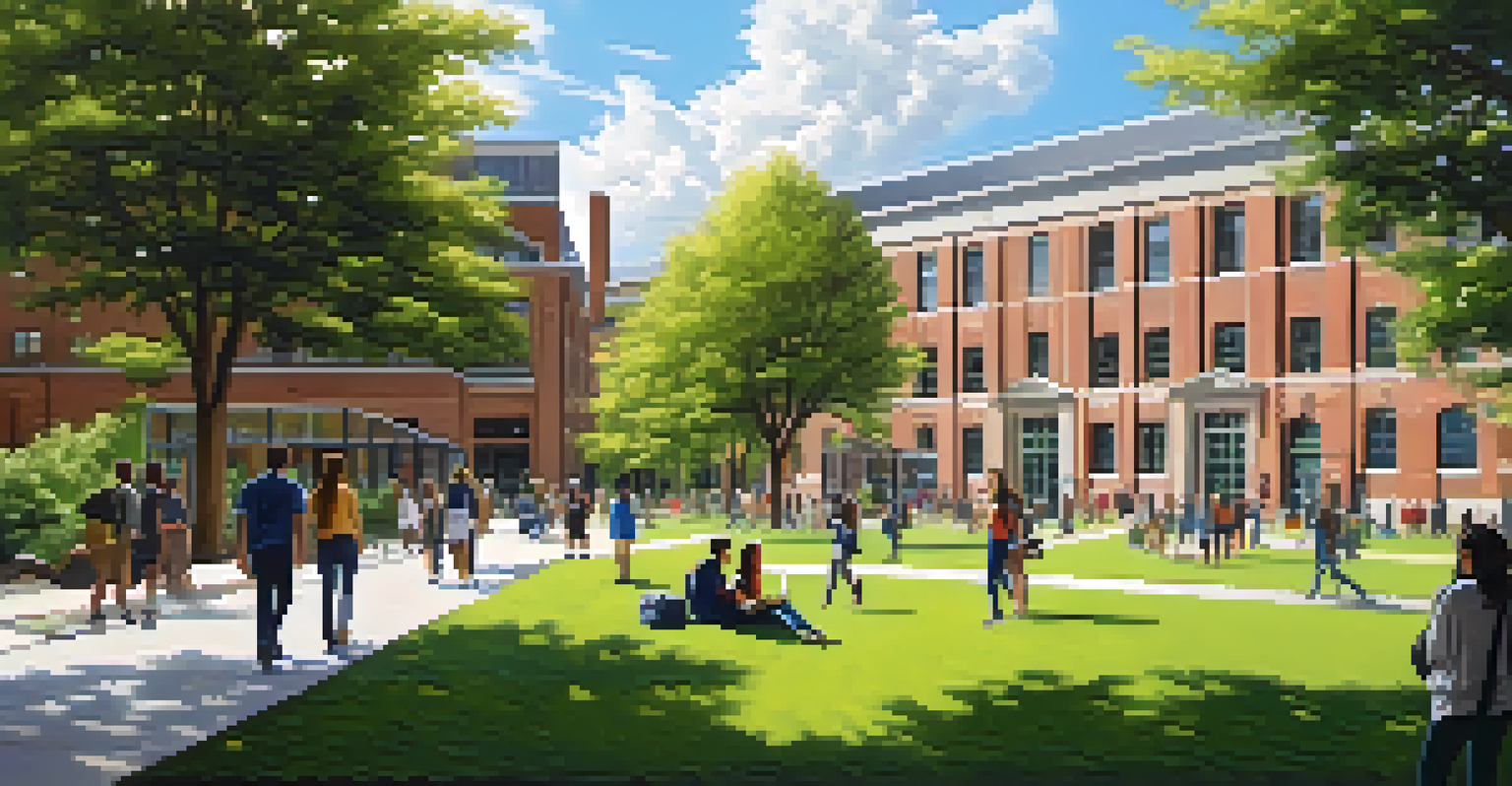The Future of Higher Education: Adapting to New Realities

The Shift Toward Online Learning and Flexibility
The rise of online learning has transformed how students access education. With the flexibility of studying from anywhere, many learners are embracing this format, allowing them to balance work, life, and studies effectively. Institutions are increasingly offering hybrid models that blend in-person and online classes, catering to diverse needs.
Education is the most powerful weapon which you can use to change the world.
This shift is not merely a response to the pandemic; it's a long-term trend. As technology continues to advance, education can become more personalized. Students can engage with interactive materials, join virtual discussions, and access resources on demand, enhancing their overall learning experience.
Moreover, the accessibility of online education is breaking down barriers for many. Students from various backgrounds can pursue degrees that were previously out of reach, leading to a more inclusive and diverse educational landscape. This democratization of learning is one of the most promising aspects of the future of higher education.
The Importance of Lifelong Learning in Today’s Economy
In an era where job markets evolve rapidly, the concept of lifelong learning has gained prominence. Professionals need to continually upskill to remain relevant, and higher education institutions are adapting by offering short courses and certifications. This flexibility allows individuals to learn new skills without committing to a full degree program.

Employers are increasingly valuing skills over formal qualifications, pushing educational institutions to focus on practical, applicable knowledge. Programs designed in collaboration with industries ensure that what students learn is directly relevant to current job demands. As a result, students can enter the workforce better prepared and more competitive.
Online Learning's Lasting Impact
The shift to online learning has not only increased accessibility but also personalized education, making it a long-term trend.
Additionally, online platforms and resources now provide opportunities for people of all ages to learn at their own pace. Whether it's mastering a new software program or exploring a completely different field, the availability of educational resources makes it easier than ever to pursue lifelong learning.
The Role of Technology in Transforming Higher Education
Technology is revolutionizing higher education in ways we could only imagine a decade ago. From artificial intelligence (AI) to virtual reality (VR), these tools are enhancing the learning experience and making it more engaging. For instance, VR allows students to immerse themselves in historical events or complex scientific concepts in a way that textbooks cannot provide.
The future belongs to those who believe in the beauty of their dreams.
Furthermore, AI-driven analytics are helping educators tailor their teaching strategies to meet individual students' needs. By analyzing data on student performance, universities can identify areas where learners struggle and provide targeted support. This personalized approach fosters a more conducive learning environment.
As educational technology continues to evolve, we can expect even more innovative solutions. Tools that facilitate collaboration across geographies, gamified learning experiences, and adaptive learning systems are just a few examples that will shape the future of education, making it more interactive and dynamic.
The Growing Need for Interdisciplinary Studies
In today's interconnected world, the boundaries between disciplines are increasingly blurred. This reality calls for an educational approach that encourages interdisciplinary studies, where students can combine insights from various fields. For instance, a student studying environmental science might also delve into economics and sociology to gain a holistic understanding of sustainability.
Higher education institutions are recognizing the value of this approach and are beginning to create programs that promote collaboration. By fostering teamwork among students from different majors, universities prepare them for the complexities of real-world problems, which rarely fit neatly into one category.
Lifelong Learning is Essential
In a rapidly changing job market, ongoing skills development through flexible courses is crucial for professional relevance.
Moreover, interdisciplinary studies can spark creativity and innovation. When students bring diverse perspectives to the table, they are more likely to develop unique solutions to pressing challenges, making them invaluable in the workforce. This shift reflects a growing recognition that the future of higher education must adapt to the multifaceted nature of contemporary issues.
The Emphasis on Mental Health and Well-being
As academic pressures mount, the importance of mental health and well-being in higher education is gaining recognition. Institutions are increasingly investing in resources and programs aimed at supporting students' mental health, creating a more balanced and nurturing environment. From counseling services to wellness workshops, universities are prioritizing student well-being.
This focus on mental health has become even more critical in the wake of the pandemic, which exacerbated feelings of isolation and anxiety among students. By fostering a culture that promotes open conversations about mental health, institutions can help reduce stigma and encourage students to seek support when needed.
Moreover, integrating mental health education into the curriculum can equip students with coping strategies and resilience. As they learn to manage stress and prioritize self-care, they not only enhance their academic performance but also prepare for the challenges they will face beyond their college years.
The Impact of Globalization on Higher Education
Globalization is reshaping higher education in profound ways, encouraging institutions to think beyond national borders. As students seek international experiences, universities are responding by offering study abroad programs, international partnerships, and global curricula. This exposure to diverse cultures and ideas enriches the educational journey and broadens students' perspectives.
Moreover, the influx of international students into universities creates a vibrant campus culture. This diversity fosters cross-cultural understanding and collaboration, preparing students for a globalized workforce. In an interconnected world, the ability to work with individuals from various backgrounds is a crucial skill.
Globalization Shapes Education
Globalization is driving higher education institutions to incorporate international perspectives, enriching the learning experience.
As a result, higher education institutions must adapt to these global realities by integrating international perspectives into their programs. By emphasizing global citizenship, universities can cultivate a generation of graduates who are not only well-educated but also culturally competent and socially aware.
The Future Landscape of Higher Education: What Lies Ahead
Looking ahead, the landscape of higher education is poised for significant transformation. With the challenges of the past few years as a catalyst, institutions are likely to adopt more flexible and innovative approaches to learning. The emphasis will be on creating adaptive learning environments that can respond to the evolving needs of students and the job market.
Furthermore, as technology continues to advance, we can expect to see more immersive and interactive educational experiences. Virtual and augmented reality, along with AI-driven learning tools, will likely become staples in classrooms, enhancing engagement and comprehension.

Ultimately, the future of higher education will hinge on its ability to adapt and evolve. By embracing change and focusing on the holistic development of students, institutions can prepare graduates who are not only knowledgeable but also equipped to thrive in an ever-changing world.